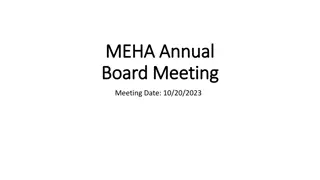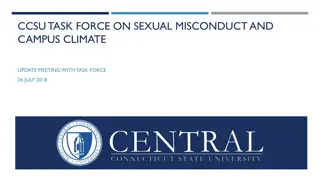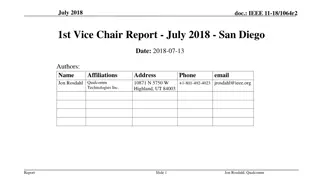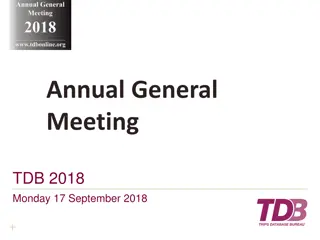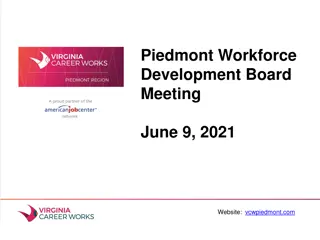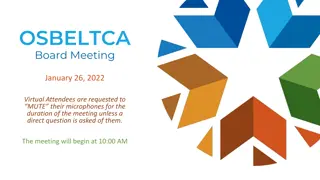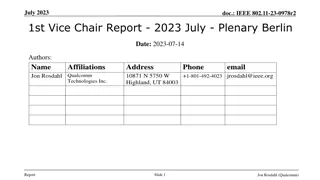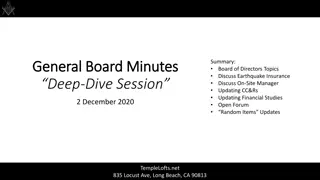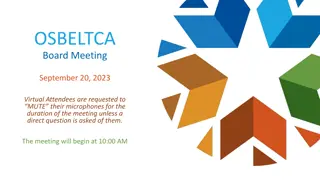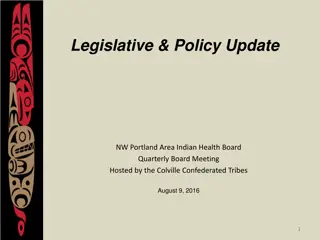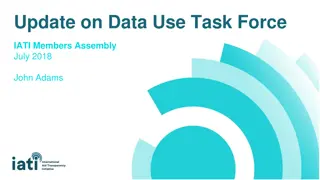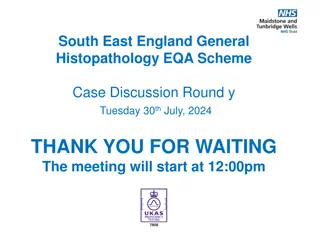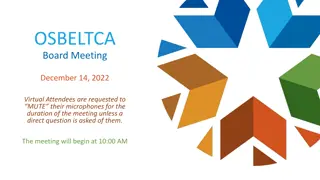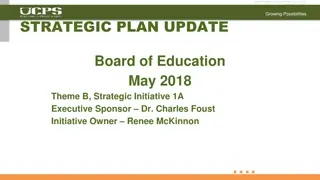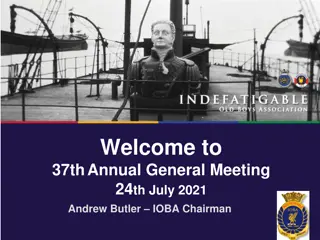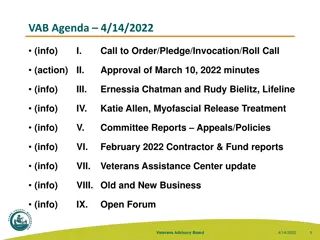Update from Science Board Meeting - July 2018
The Science Board provided a brief update on activities over the past year, focusing on discussions regarding the excellence of scientific work, the importance of computing in various fields, and the challenges posed by financial constraints and Brexit uncertainties in the UK. The Board also highlighted the growth in the Science Budget, additional funding for specific projects, and the need to seize new opportunities while maintaining a focused program.
Uploaded on Oct 10, 2024 | 0 Views
Download Presentation

Please find below an Image/Link to download the presentation.
The content on the website is provided AS IS for your information and personal use only. It may not be sold, licensed, or shared on other websites without obtaining consent from the author. Download presentation by click this link. If you encounter any issues during the download, it is possible that the publisher has removed the file from their server.
E N D
Presentation Transcript
Update from Science Board PPAP Meeting July 2018 A brief update on activities over the past year. Sean Freeman The University of Manchester
Science Board Core Membership Stewart Boogert, Royal Holloway Jo o Cabral, Imperial College London Bill Chaplin, University of Birmingham Peter Clarke, University of Edinburgh Bill David, University of Oxford and RAL Christine Davies, University of Glasgow Rory Duncan, Heriot Watt University Karen Edler, University of Bath Sean Freeman (Chair) University of Manchester Chris Hawes, Oxford Brooks Ofer Lahav, University College London Jayne Lawrence (Deputy Chair) University of Manchester Paul McKenna, Strathclyde Andy Parker, University of Cambridge Don Pollacco, University of Warwick Tara Shears, University of Liverpool STFC Office: Trish Mullins Colleagues from the non-Core SB membership, from Advisory Panels and from the communities have helped with a variety of tasks including project reviews, Programmatic Reviews and Balance of Programme.
Environment: CSR-2016 (relative calibration) pretty good compared to other areas of Government. CSR-2016 (absolute calibration) continuing flat cash for the core of the Science Budget, indicative budgets for the last two years. Growth in Science Budget has ODA requirements Newton and Global Research Challenges Fund (GCRF). Autumn Statement 2016: further growth in Science Budget also has industrial requirements Industrial Strategy Challenge Fund (ISCF) Turbulence BREXIT. Changes in Government; new minister. Changes in the landscape with UKRI with additional new funding pots. Good news Some extra resource funding ( 5M pa) to protect international commitments and early R&D a benefit to LHC Upgrades. Additional 10m for Dirac secured from BEIS in 18/19 and 4m p.a for 4 years, starting in 18/19, for e-infrastructure across STFC programmes
What has Science Board discussed since last year? We do talk across the whole of STFC scientific activities including astronomy, space science, nuclear physics, neutron facilities, light sources Some common threads in SB discussions have been: Excellence of the science that is being done across the whole programme. Increasing importance of computing (HPC, HTP, data analytics ) in most areas. Extreme difficulties of flat cash lack of resource is really biting programme feels impressive but narrow. Worries about maintaining an already very focussed programme and making sure that new opportunities are realised. Stark contrast between an unprecedented increase in the Science Budget and RCUK Core Programmes under unprecedented financial pressure. Concern and uncertainty over BREXIT. but here concentrate on topics relevant to PAP and HEP.
Exploitation and Project Grants Experimental Particle Physics Consolidated Grants Round 2018: Deadline now passed and PPGP due to report to Science Board in October. Project Peer Review: Awarded projects in 2017: DUNE Pre-construction phase. Hyper-K Pre-construction phase. Currently proceeding through project review: ATLAS Phase II Upgrade awaiting financial approval from BEIS/UKRI. CMS Phase II Upgrade feedback to applicants due imminently. eEDM feedback to applicants due imminently. DUNE Construction accepted SoI. Priority to be considered as part of the Programme Evaluation: Advanced LIGO; Production Phase of CTA; G3 R&D for Next Generation Dark Matter Searches. SHiP and MoEDAL. Advanced LIGO Project put forward to UKRI fund for International Collaboration
Computing At the Feb SB meeting, received a presentation on the Science Case for DiRAC 3. SB strongly endorsed the wide-ranging and diverse case, which addresses aspects of practically all areas within the PPAN science programme. At the June meeting, considered positively the SoI for DiRAC 3 as a precaution should funding appear at short notice in the future.
Advisory Panels and Accelerator Strategy Board Claire Shepherd-Themistocleous (Chair PPAP), Chamkaur Ghag (Chair PAAP) and Andy Wolski (Chair ASB) joined SB as part of the annual series of meetings and gave an updates on their activities, science programmes and opportunities, and raised concerns and issues. Common concerns about the levels of funding for the core programme; worries about the best way to access funding provided by GCRF and ISCF; about how to inform Government of these issues; and worries about any potential growth in CDT mechanisms at the expense of funding for quota studentships. David Colling will join SB in October to discuss CAP activities. All APs participated with SB members in a workshop in January to begin the process of updating the PPAN Science Challenge Questions followed up with a meeting of AP Chairs and discussed at SB meetings in Feb, May and June. The process of revision should be completed soon. APs also gave input to the Skills Balance of Programme, which is now published.
Accelerator Strategic Review SB gave input at several stages during this science-driven review which will act as a basis to develop STFC strategy for accelerator research, development and delivery, to ensure UK maintains world-class capabilities. The Review Panel chaired by Stewart Boogert found a broad and vibrant current programme. Roadmaps have been developed for the thematic areas: Neutron Sources; Light Sources; Particle and Nuclear Physics Machines; Novel Accelerators; Industrial, Medical, Defence and Security Applications. Report is published. Particle Theory Review SB noted that the PPT programme was world-leading and had strength in all thematic areas of activity - the community have significant funding from the European Research Council. The review panel emphasized strongly the constrained STFC funding, which has led to significant impact on levels of PDRA funding. Both reliance on EU funding and the low level of STFC PDRA support introduce risk in sustaining the current programme. Findings will be fed into the Programme Evaluation. Detectors and Instrumentation Strategic Review Initial step in developing a strategy for one of five enabling technology areas for STFC. Panel has met and has discussed developing needs, technologies and future opportunities relevant to a decadal timescale. Report due late 2018.
PPAN Balance of Programme and Programme Evaluations Aim: to look at the portfolio and science strategy to define a balanced programme of excellent science within a realistic financial planning envelope for each scientific discipline Computing Q4 2017 2016, 2019, Astroparticle Q1 2018 Nuclear Q2 2018 Programme Evaluations Balance of Programmes Particle Q3 2018 Astrophysics Q3 2018 Accelerators Q4 2018
Paul Alexander Andreas Juettner Ofer Lahav (chair) Victoria Martin Andrew McNab Jacky Pallas Andrew Sansum Debra Sijacki Richard Battye Garret Cotter Giles Hammond Alex Murphy Tara Shears (chair) Morgan Wascko Computing Q4 2017 Astroparticle Q1 2018 Nuclear Q2 2018 Particle Q3 2018 Astrophysics Q3 2018 Mike Bentley Maria Borge Jon Billowes Alison Bruce Jordi Jose Peter Jones Don Pollacco (chair) Paul Stevenson Ofer Lahav (chair) To be confirmed First meeting tba Accelerators Q4 2018 ~ 6 months for each evaluation Chairs from SB to help with continuity
Specific tasks: Rank projects/experiments and outline scientific priorities within the area. Provide advice on the shape of the programme. Examine funding levels for new ideas and technology development. Consider how to best ensure appropriate support for exploitation and return on investment for STFC-funded projects. Consider consequences of flat cash, 10% funding over the next 5 years. Consider whether each project sits within the appropriate research area for future budgetary tensioning. Input from advisory panels, experiment and project PIs, but make use of relevant up to date material and trying not to overburden community with requests The outcome of the programme evaluations will be published and available to the community. http://www.stfc.ac.uk/about-us/our-purpose-and-priorities/planning-and-strategy/programme-evaluation/balance-of-programme-exercise-ppan/ http://www.stfc.ac.uk/about-us/our-purpose-and-priorities/planning-and-strategy/programme-evaluation/balance-of-programme-exercise-ppan/ More information: http://www.stfc.ac.uk/about-us/our-purpose-and-priorities/planning-and- strategy/programme-evaluation/balance-of-programme-exercise-ppan/
Delivering a World Class Research Programme Consultation to identify new world class science and technology proposals for potential future investment. to ensure that STFC is well placed to seize potential future opportunities should funding opportunities arise. to develop an ambitious portfolio of outline business cases for priority projects that relate to our strategic scientific and research infrastructure objectives, covering our complete remit, and driven by our communities. Via the Advisory Panels each science area has been asked over the summer to identify 4 priority projects (1 large scale , 1 or 2 medium scale and 1 or 2 small scale ) that can be started within the next 5 to 6 years. There are no formal financial definitions for the scale; large scale could be above 50m. Science Board will be considering each project identified by the community at an extraordinary meeting in October, to confirm that the science is important in principle (but not to prioritise/rank/sift ).
Some final thoughts ALL STFC PPAN Programmes are making a strong impact. For example, UK A, PP and NP all in the top four internationally for field-normalized citations in period 2014-16. Core of the Science Budget is still flat cash utterly toxic. Flat cash for seven years, but still world leading? STFC-supported science and facilities: uniquely international, uniquely collaborative, uniquely long time scales - needs emphasis within UKRI. ERC has been important for several areas. Careful arguments money for science has unprecedented increases? Lots of strings with ISCF and GCRF they aren t a replacement for core funding for fundamental science . Excellent science is the primary part of any argument motivating the exercise in new projects as part of World-Class Research Programme consultation to make nest use of new opportunities within UKRI.


